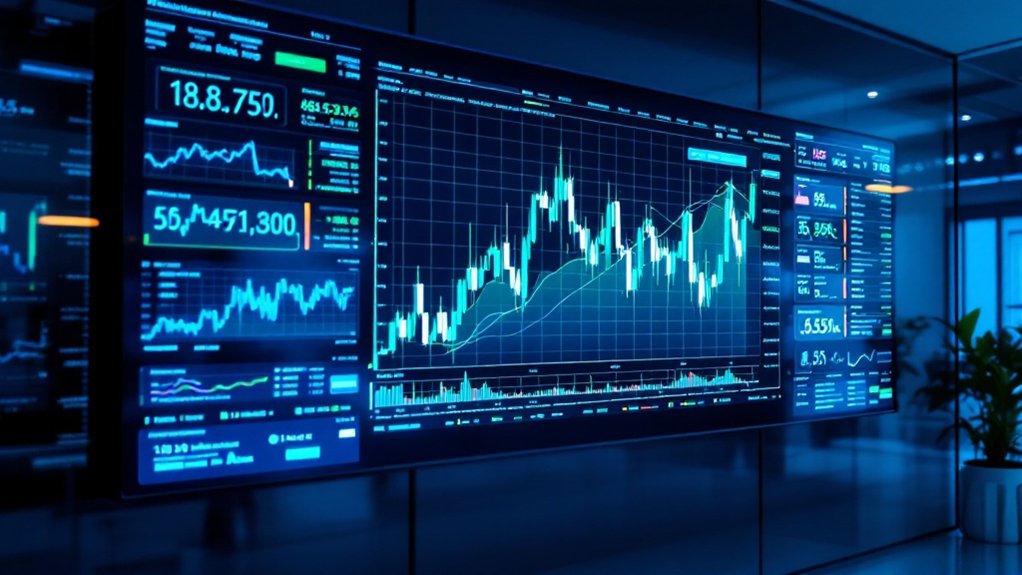An ETF (exchange-traded fund) combines elements of both stocks and mutual funds into one convenient package. Like stocks, ETFs trade on exchanges throughout the day at market-driven prices. But similar to mutual funds, ETFs hold multiple securities – think stocks, bonds, or commodities – in a single basket. They typically have lower fees than mutual funds and offer better tax efficiency. From vanilla index trackers to exotic currency plays, ETFs open up a world of investment possibilities.

Exchange-traded funds, or ETFs, are the Swiss Army knives of investing. These market chameleons operate like stocks but pack the diversified punch of mutual funds. They trade on exchanges throughout the day, their prices bouncing up and down based on good old supply and demand. Behind the scenes, specialized players called authorized participants keep everything running smoothly through a creation and redemption process that would bore most people to tears.
The ETF universe is vast and varied. Want to track the S&P 500? There’s an ETF for that. Fancy some corporate bonds? Got those too. Feel like betting on the Romanian leu against the Japanese yen? Well, currency ETFs have got you covered. From broad market indices to niche sectors like cybersecurity or cannabis, these financial Swiss rolls come in every flavor imaginable. The first ETF in the United States was the SPDR S&P 500 launched in 1993.
From vanilla index trackers to exotic currency plays, ETFs serve up investment options for every appetite and risk tolerance.
The beauty of ETFs lies in their efficiency. They’re typically cheaper than their mutual fund cousins, thanks to lower management fees. They’re transparent too – no hiding what’s in the portfolio. Every day, these funds show their cards, letting investors know exactly what they’re holding. Active ETFs aim to beat market benchmarks through strategic management. The power of compounding can significantly boost returns when ETF dividends are reinvested over time.
And here’s a bonus: their structure often makes them more tax-efficient than traditional mutual funds. Not that anyone enjoys thinking about taxes.
Trading ETFs is straightforward, but it’s not without its quirks. They trade like stocks, which means you can buy or sell them whenever markets are open. But just like stocks, you’ll pay the spread – the difference between what buyers will pay and what sellers will accept.
Some ETFs trade as smooth as butter, while others can be about as liquid as cement.
Of course, ETFs aren’t perfect. They can track their target indices about as well as a caffeinated squirrel sometimes. Market volatility can send them spinning, and some of the more exotic varieties are complicated enough to give rocket scientists headaches.
International ETFs throw currency risk into the mix, just to keep things interesting. But for many investors, these investment vehicles offer a convenient way to access various markets and asset classes without breaking the bank or requiring a PhD in finance.
Frequently Asked Questions
Can I Buy ETFS Through My Retirement Account?
Investors can purchase ETFs through most retirement accounts, including IRAs and 401(k)s, using online brokerage platforms. These accounts offer access to a wide variety of ETF investment options.
What Happens to My ETF Investment if the Fund Company Fails?
ETF assets are legally protected and held by independent custodians, not the fund company. Investors’ holdings remain secure even if the provider fails, with assets distributed or transferred accordingly.
Are ETFS Safer Than Individual Stocks During Market Crashes?
ETFs generally provide better safety during market crashes through diversification across multiple securities, reducing single-stock risk, though they still experience market declines alongside the broader indices.
How Often Do ETF Holdings Change Within the Fund?
ETF holdings change based on multiple factors: daily for volatile indices, quarterly for broad market funds, and annually for stable indices. Rebalancing frequency depends on investment strategy and underlying assets.
Do All ETFS Pay Dividends to Investors?
Not all ETFs pay dividends. Distribution depends on the underlying assets held within the fund. While some ETFs regularly distribute dividends, others focus on growth or hold non-dividend-paying securities.





